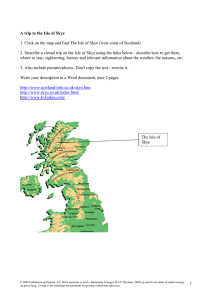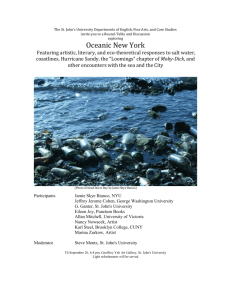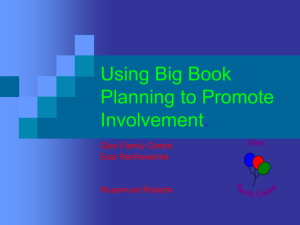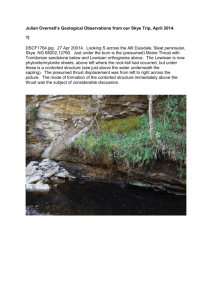Report to Partnership Meeting 6 February 2015
advertisement
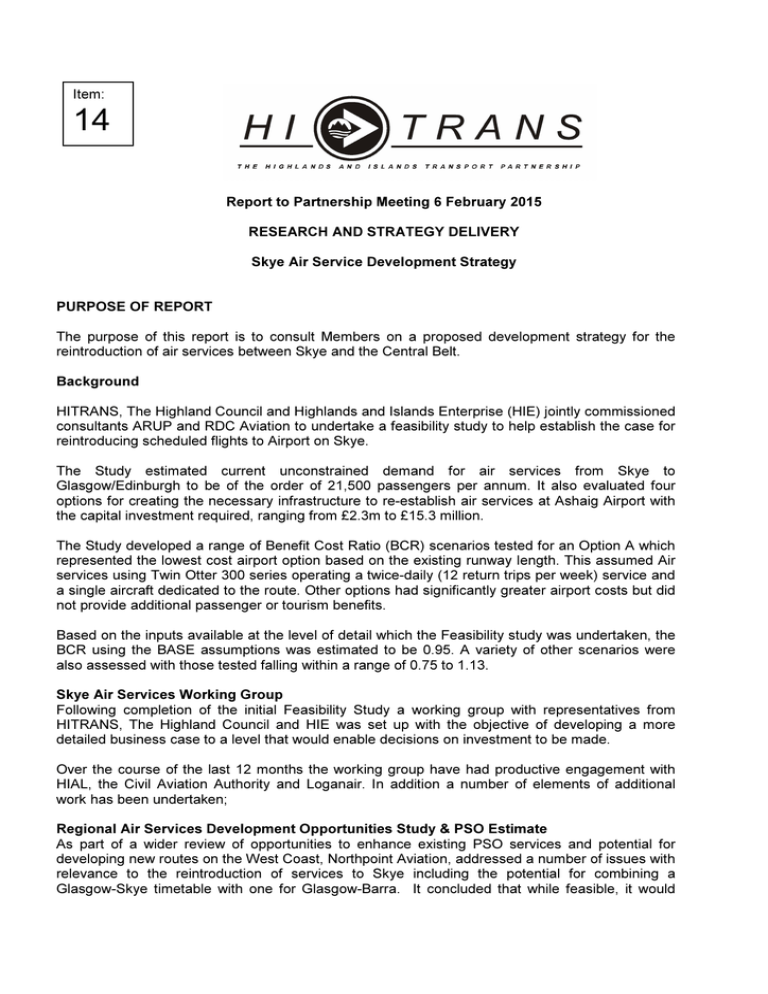
Item: 14 Report to Partnership Meeting 6 February 2015 RESEARCH AND STRATEGY DELIVERY Skye Air Service Development Strategy PURPOSE OF REPORT The purpose of this report is to consult Members on a proposed development strategy for the reintroduction of air services between Skye and the Central Belt. Background HITRANS, The Highland Council and Highlands and Islands Enterprise (HIE) jointly commissioned consultants ARUP and RDC Aviation to undertake a feasibility study to help establish the case for reintroducing scheduled flights to Airport on Skye. The Study estimated current unconstrained demand for air services from Skye to Glasgow/Edinburgh to be of the order of 21,500 passengers per annum. It also evaluated four options for creating the necessary infrastructure to re-establish air services at Ashaig Airport with the capital investment required, ranging from £2.3m to £15.3 million. The Study developed a range of Benefit Cost Ratio (BCR) scenarios tested for an Option A which represented the lowest cost airport option based on the existing runway length. This assumed Air services using Twin Otter 300 series operating a twice-daily (12 return trips per week) service and a single aircraft dedicated to the route. Other options had significantly greater airport costs but did not provide additional passenger or tourism benefits. Based on the inputs available at the level of detail which the Feasibility study was undertaken, the BCR using the BASE assumptions was estimated to be 0.95. A variety of other scenarios were also assessed with those tested falling within a range of 0.75 to 1.13. Skye Air Services Working Group Following completion of the initial Feasibility Study a working group with representatives from HITRANS, The Highland Council and HIE was set up with the objective of developing a more detailed business case to a level that would enable decisions on investment to be made. Over the course of the last 12 months the working group have had productive engagement with HIAL, the Civil Aviation Authority and Loganair. In addition a number of elements of additional work has been undertaken; Regional Air Services Development Opportunities Study & PSO Estimate As part of a wider review of opportunities to enhance existing PSO services and potential for developing new routes on the West Coast, Northpoint Aviation, addressed a number of issues with relevance to the reintroduction of services to Skye including the potential for combining a Glasgow-Skye timetable with one for Glasgow-Barra. It concluded that while feasible, it would require the use of two Twin Otters assuming that night-time operations would be possible at Skye; and that the Glasgow PSO services to Campbeltown and Tiree were covered by a Saab 340 or similar aircraft. It also indicated that the leasing and maintenance costs for operating Twin Otters were likely to be higher than those estimated in the Skye Feasibility study especially if the service was to be combined in some way with the Barra service. HITRANS subsequently commissioned a Northpoint Aviation in partnership with Nineteen 100, to provide an updated estimate of the annual subsidy requirements of a providing a scheduled Skye air service based on the operating model outlined in the Skye Feasibility Study. The revised estimate based on a base case passenger volume of 14,500pa and a fare scale of £100 per sector (low end of possible fare scale charge) is £923,764. CAP 232 Survey and Aerodrome License Following advice from the CAA, HITRANS also commissioned SLC Associates to undertake a CAP232 survey of the airstrip which will enable the CAA to provide advice on the necessary infrastructure and operational requirements that will be required for scheduled services to be reintroduced once an application for an aerodrome license has been submitted. -------------------------------------------- Over the coming months HITRANS intends to progress the following additional work in partnership with other Working Group members so that an updated business case can be developed towards the end of summer 2015; Aerodrome Licensing Process It is the responsibility of the CAA to ensure that the holders of an aerodrome licence are competent and suitable persons to exercise the privileges of that licence. The CAA uses CAP 168 Licensing of Aerodromes in support of the granting of an aerodrome licence. Aerodromes where flights for the purpose of the commercial air transport of passengers or the public transport of passengers, and/or flying training in aircraft above specified maximum total weights authorised take place, are required to be licensed by the CAA. HITRANS and The Highland Council have commenced this process so that a greater understanding of the likely CAPEX and OPEX can be obtained. This will facilitate a site visit by the CAA and their input into the investment needed at the aerodrome near Broadford. Wider Socio-Economic Benefits Running parallel to this technical work, the Working Group hope to gather further information on the wider social and economic benefits that a scheduled service to the central belt may enable by undertaking detailed business surveys of the companies and organisations likely to utilise any service. Colleagues at Highlands and Islands Enterprise are leading on this work which is critical to the overall business case as the original feasibility study only identified a marginal Benefit Cost Ratio case and while the likely capital costs appear manageable, it is the operating / revenue costs is likely to be the most significant challenge to overcome. Recommendation Members are invited to support the proposed development strategy for the re-introduction of air services to Skye. Risk RTS delivery impact √ Comment This work supports RTS Strategic priority S11a to reintroduce scheduled air services between Skye and the Central Belt Policy √ Financial Equality - Report by: Designation: Date: This work supports development of the Aviation policies set out in the RTS £10,000 from the 2014/15 Research and Development Budget Neil MacRae Partnership Manager, HITRANS 06th February 2015
